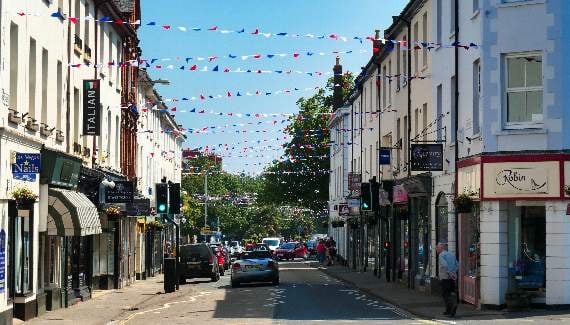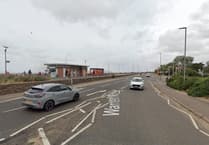The Government describes a Business Improvement District as a business-led partnership created through a ballot to deliver additional services to local businesses. It covers a defined area where a levy is charged on all business rate payers. They last up to five years, and there has to be a new ballot for the BID scheme to continue for another term.
The Government says there is no limit on what projects or services can be provided through a Business Improvement District. The only requirement is that it should be something that is in addition to services provided by local authorities. Improvements may include, but are not limited to, extra safety/security, cleansing and environmental measures.
Voting in Minehead will be by way of a postal ballot which take place over 28 days, ending at 5 pm on Thursday, June 8, and a simple majority will decide the issue.
The case for another BID
BID chairman Graham Sizer said the town had been through some challenging times since 2018, most notably the Covid pandemic.
However, he said businesses had adapted well and demonstrated their resilience while also supporting each other, showing kindness and empathy.
Mr Sizer said: “Minehead BID played its part in supporting businesses with the safe re-opening of our town and by providing information and advice on grants available, support that you have told us has been invaluable.”
He said footfall monitoring software in The Parade showed Minehead had bounced back to pre-pandemic levels while at the same time it had one of the lowest vacancy rates of any town in the South West.
Mr Sizer said Minehead BID’s achievements had helped raise the town’s profile, created a more attractive environment, and a better promoted and vibrant place.
If businesses gave their support, financial contributions, time, expertise, and ideas, BIF could keep the momentum going.
It remained committed to improving Minehead and to securing additional income to add value to the levy contributions in the next term as haf been the case during the past five years.
Mr Sizer said: “We successfully levered in £135,000 from other sources, that equates to over a year’s levy income, money that simply would not have been secured without facilitation from Minehead BID.
“Looking to the future, we have been surprised and encouraged by the interest and involvement of levy payers in our journey towards a new five-year term.
“More than two-thirds of our businesses have given valuable feedback and as a result in the last six months we have also increased our board with some new and enthusiastic directors.
“We have listened to your views about what projects are essential to continue with, and taken on board new ideas put forward which have subsequently informed this business plan.
“You have also indicated areas where we need to do more and we have listened, reflected, and made changes.
“A ‘No’ vote will mean that all projects and services that the BID delivers will come to an end on June 30.
“No other organisation will have the capacity or resources to step forward and continue with the projects that you have prioritised, the projects will all cease.
“While our resources may be modest, it is the strength of the business community working together through the BID that gives us the chance to improve what we have.
“Together, we are a stronger voice, and we can look forward to more shared success, bringing future opportunities, and continuing to fulfil our vision of Minehead as a premier South West destination.”
Mr Sizer said 68 per cent of levy payers had actively engaged with the BID 2 consultation process, providing valuable information about how the levy income should be spent. Engaged businesses were a cross-section of business sizes and types from across the BID boundary, including shops, offices, charities, hospitality, leisure, and the public sector, featuring those who paid the least and most in levy contributions.
Based on the feedback, the issues that would be integral to a second BIF term included retaining and improving the attractiveness and ‘look’ of Minehead, and events which complemented businesses with their timing carefully considered.
Achievements of the BID
Graham Sizer says highlights of BID achievements since 2018 include the following
- Installed bunting in Friday Street, Holloway Street, Park Street, Wellington Square. and The Parade
- Refreshed existing planters, provided new planters, and more than 140 hanging baskets for spring, summer, and winter
- Installed new benches in the town centre and seafront. Facilitated new illuminations in The Avenue
- Joined with both councils to initiate a Britain in Bloom campaign
- Contributed more than half of the funds required to improve the Christmas lights infrastructure in The Parade
- Contributed funding towards the defibrillator initiative
- Provided vinyls in empty shop windows, while Minehead continued to have one of the lowest shop vacancy rates in the South West
- Provided a street cleaning service on the seafront to provide an additional daily litter pick and cleaning service from 3 pm to 7.30 pm during the school summer holidays
- Successfully lobbied the council to clear the sand filled seafront drains
- Weekly winding and annual maintenance cost of the town clock
- Funded free car parking in Minehead’s car parks
- Promoted local businesses through an online directory of all BID members on a dedicated Minehead shopping website
- Updated and completely refreshed the business noticeboards and maps in the town centre including the food and drink map each year
- Funded a series of events and festivals throughout the year, including two Eat Festivals, the Steampunk Festival, 1940s weekend and more
- Sponsored the entertainment at The Old Hospital at Christmas in conjunction with Gateway Events
- Supported businesses to achieve ‘plastic free status’ and funded the Plastic Free Minehead website (www.plasticfreeminehead.org.uk)

The case against another BID
The case against is made by campaigner Ben Jewell.
Mr Jewell said the glossy Minehead BID vote ‘yes’ business plan could easily encourage people to believe the board had done a great job and the town’s businesses were all happy and wanted to do it again.
But Mr Jewell, of Excom, Friday Street, said: “Reality is that this is far from the truth. Naturally, there are some businesses that support BID, but the fact is Minehead BID has failed to deliver on what they promised us in their first term business plan, and alienated a significant proportion of the business community who really hope it is not voted back in.
“The strength of feeling against BID from such a large number of voting businesses speaks volumes.”
Mr Jewell said business running costs were already high enough and in the current economic climate the BID proposal needed to be a ‘shining example’ to ensure it represented a solid return on investment opportunity, rather than a “nice thing to do”.
He said given BID’s track record of failing to deliver what was promised in the 2018 business plan, it fell short of instilling people with confidence that it was a good investment for another five years.
The claim that without BID, £135,000 additional funding would not have been secured for Minehead was a ‘clear mistruth’, an attempt to deceive voters, he said.
Most of the funding was from the Covid Emergency Town Centre Recovery Fund (ETCRF) which also supported other towns, including Watchet, Wellington, and Taunton, which did not have a BID.
Too much BID money was being used for things councils should fund, while BID also gave too much of its money to the councils.
Freedom of Information requests confirmed Minehead BID had paid more than £100,000 to local councils, equivalent almost to a year’s levy.
A large number of councillors also attended and influenced BID board meetings.
Mr Jewell said there were ‘reputational problems’, poor communication, an unwillingness to engage with levy payers, and a lack of transparency with BID.
A levy payers’ meeting was cancelled at short notice and not rearranged, emails were not responded to, and it had not shared detailed financial records on spending.
Poor financial management and decision making, money being squandered, high administration costs, and spending on consultants, managers, and other service providers were also issues, said Mr Jewell.
He said the rateable value threshold appeared to have been raised to reduce the ‘No’ vote, removing about 50 businesses, which meant the tax burden was falling on a smaller number of businesses.
Mr Jewell said: “If BID was truly inclusive and democratic, all Minehead businesses would be involved, have a vote, and be able to work together.
“The idea that a small group of private individuals draw a line around selected businesses in a geographical location, then decide what businesses to exclude with a manipulated rateable value threshold, could never define democracy.”
He said BID was duplicating efforts like Minehead’s destination marketing when such ‘investment’ was not needed, given there were alternatives such as Enterprising Minehead Fund, Minehead Coastal Community/MCDT resources, a town council, county council, Tourist Information Centre, and chamber of commerce.
Mr Jewell said Minehead was successful without a BID, it already had marketing, flowers, events, and was presentable and would continue to have them.
“Local businesses want a scheme that brings everybody back together after the massive division, upset, and issues BID has caused,” he said.
“There are and has always been other external investment and organisations that work for the good of the town and there are a considerable amount of both businesses and residents that are more than capable of working together, who would rather contribute to a scheme that offered value for money and was more inclusive.”
One Minehead trader who wished to remain anonymous said: “My business pays in just over £100 per year, it may not seem like a lot of money, but it is not an investment, so much is wasted and goes out of the local economy, I am sure a few hanging baskets and some bunting does not cost £100,000 a year.”
Another trader said: “I have traded on the seafront for over 20 years, BID have had a considerable amount of money, we get forgotten about, they say they listen, but nothing changes.
“I voted ‘No’ five years ago and will vote no again, there is not anything different in the new business plan than the old one, probably less, actually.”
The vote ‘No’ campaign has been helped by Shawn Rutter, a national campaigner against ‘inappropriate and undemocratic practices’ of BIDs.
Mr Rutter said: “Unfortunately, BID is controversial and created division in Minehead as it does in other towns, but whichever way the ballot result goes, afterwards the businesses need to put campaigning behind them and pull together in the same direction.”
He said the amount of council influence on the BID board was ‘way beyond’ anything he had seen with other BIDs and probably contravened the company’s rules, as it was meant to be an initiative for businesses.




